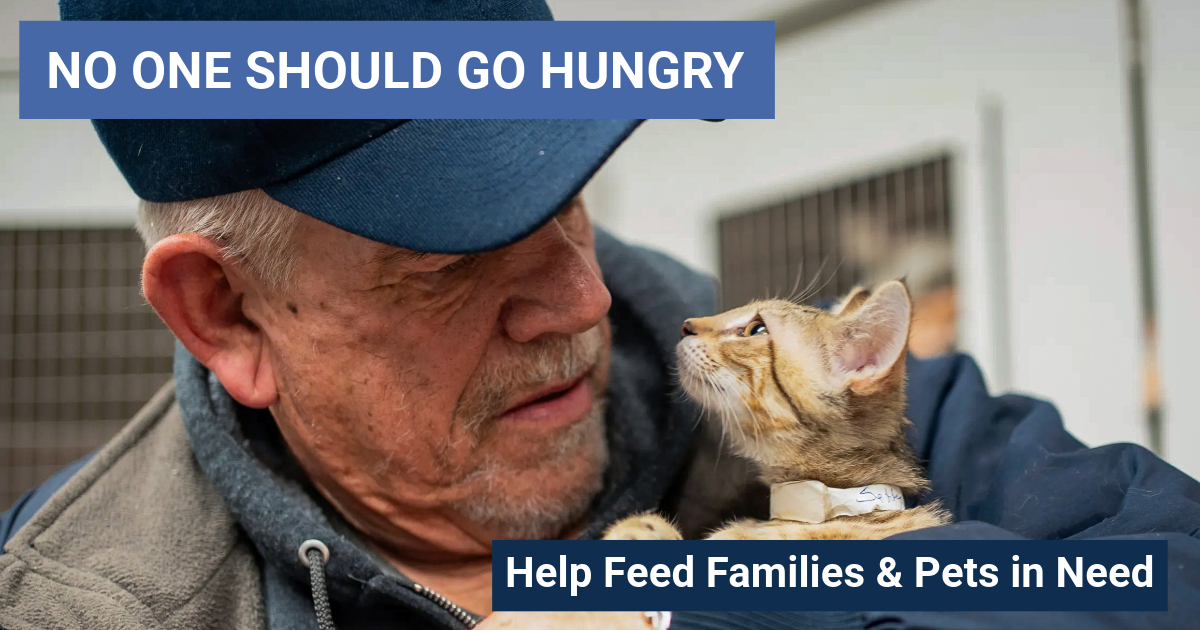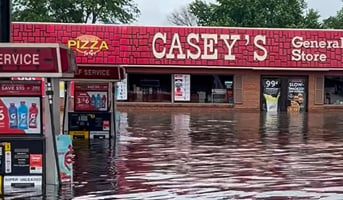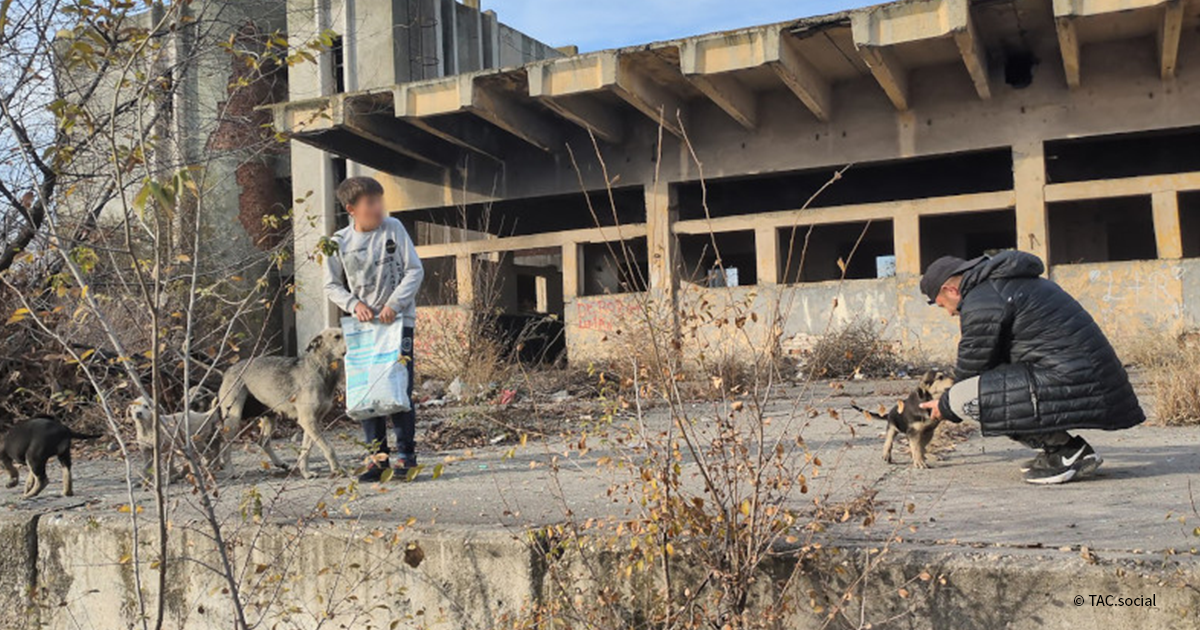Help Fill the Gap: Why Pet Food Matters as SNAP Benefits Threaten to Expire

A looming hunger catastrophe
SNAP (Supplemental Nutrition Assistance Program) funding is at risk of lapse on November 1, 2025. Advocates warn that such a lapse could create “the greatest hunger catastrophe in America since the Great Depression”. If funding lapses, nearly 42 million Americans would lose food assistance, leaving families across the country facing empty pantries just as the holiday season begins.
Beyond the human toll, the end of SNAP assistance would also threaten animals. News reports estimate that around 30 million pets live in homes experiencing food insecurities. Because SNAP cannot be used to purchase pet food, families often feed their pets from their own plates when pet food runs out. A lapse in benefits would deepen this crisis and force even more pet owners to share what little food they have.
Help fill the gap and feed families and pets in need.
Who relies on SNAP?
SNAP is the nation’s largest anti‑hunger program. In fiscal year 2024, it served 41.7 million people per month and provided benefits averaging $187.20 per person per month. Participants are not a monolithic group; they include:
-
Children and youth: In FY 2023, children under 18 made up about 39% of all SNAP participants, second only to adults aged 18–59. Nationally, more than 62% of participants are in families with children.
-
Seniors and people with disabilities: More than 37% of participants are in families with an older adult or disabled member.
-
Working families: More than 38% of SNAP recipients live in households where someone works. SNAP supplements low wages and helps people who earn too much for other safety‑net programs but still struggle to afford food.
-
Veterans: Approximately 1.2 million veterans live in households that participate in SNAP. Many are unemployed, disabled, or working low‑paying jobs and rely on the program to put food on the table.
SNAP is so effective that for every meal their food bank network provides, SNAP provides nine. In other words, the gravity of losing government nutrition assistance is staggering, and every donation is essential.
Pets in poverty: an invisible crisis
When households lose food assistance, it isn’t just people who go hungry—pets do too. Yet SNAP benefits cannot be used to buy pet food, and most food banks focus exclusively on human food. This leaves millions of families scrambling to feed their animals. Consider the following statistics:
-
A Harris Poll in March 2024 found that 43% of pet owners have been unable to pay for their pets’ needs at some point because of financial reasons. HSUS estimates that about 20 million pets live in households experiencing poverty, and 70 % of those pets have never seen a veterinarian.
-
The same poll shows that 91% of pet owners are willing to make personal sacrifices to care for their animals; 64% would consider taking money out of savings or going into debt, and nearly half would even change jobs or housing to keep their pet.
-
One in five pet owners struggling with food costs said they would forego their own meals to make sure their pet has enough to eat.
-
News reports estimate that about 30 million pets live in U.S. households facing food insecurities. Because SNAP benefits cannot be used to buy pet food and food banks rarely stock it, families often share their own meals with their animals; Meals on Wheels workers have even found delivered meals on the floor because seniors were feeding their pets.
These figures reveal the profound nature of the human–animal bond. Pets are family members, and many owners will skip meals so their animals can eat. Without assistance, some feel they have no choice but to surrender their pets to already overcrowded shelters—a heartbreaking consequence that further strains animal welfare systems.
Pet food is rarely prioritized
Part of the problem is that many relief agencies don’t consider pet food a priority. When community advocate Maureen Wyman proposed adding pet food to a community action agency’s food pantry, some staff balked, arguing that they “focus on people, not on pets." Yet for the families they serve, pets are their family. Because pet food isn’t covered by SNAP and is often absent from food banks, cash donations to hunger organizations frequently overlook pet supplies. That gap pushes families to feed pets human food or go without themselves.
Many food banks also lack the resources to meet the need. Without dedicated donations of pet food, the gap will persist, and pets will continue to depend on whatever is left on their owners’ plates.
You can help fundraise to ensure no one goes hungry—people or animals.
Why providing pet food matters
1. Preserving families: Pets provide companionship, emotional support, and stability during crises. Research shows that they help people cope with stress and social isolation. Ensuring pets are fed keeps families together and reduces costly shelter surrenders.
2. Public health: Pets contribute to their owners’ well‑being, from lowering blood pressure to mitigating loneliness. Losing a pet due to hunger compounds trauma for families already experiencing hardship.
3. Preventing trade‑offs: When pet food is available through relief efforts, families don’t have to choose between feeding themselves or their animals. It frees up scarce household funds for rent, medicine, childcare, and other necessities.
Greater Good Charities’ response
At Greater Good Charities, we believe no one should have to choose between feeding their family and feeding their pet. As this potential lapse in SNAP funding looms, we’re stepping in to fill the gap.
Through our nationwide network of partners and ambassadors, we’re delivering pet food and essential supplies to families in need, helping keep beloved animals in their homes and out of shelters.
Your support helps ensure that no one in the family—human or animal—has to go hungry. Together, we can keep pets fed, families supported, and communities strong.
How you can help
Families with pets face impossible choices if SNAP benefits disappear. Children, seniors, veterans, and people with disabilities will be disproportionately affected, and many will sacrifice their own meals to keep their pets from going hungry. By recognizing that pets are family and ensuring that relief efforts include pet food and supplies, we can keep families whole. Greater Good Charities is committed to being there when it matters, and we need you to join us in filling this critical gap.


